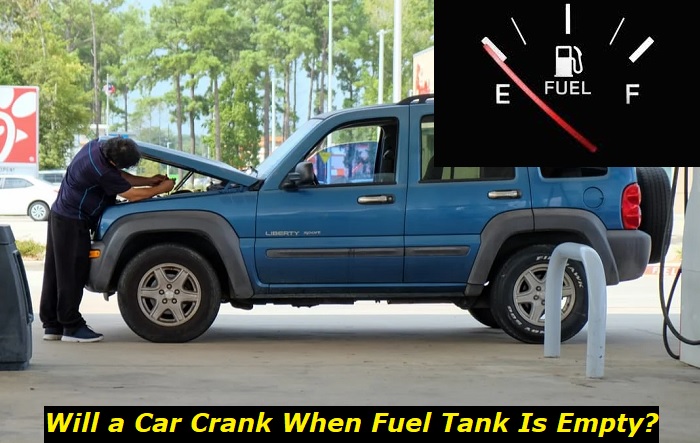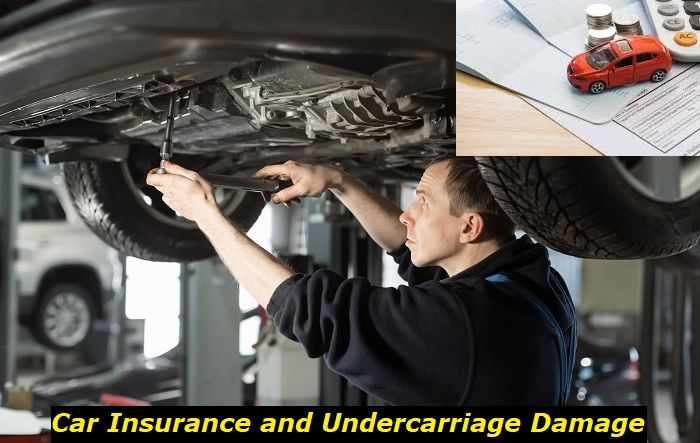Your car will crank if there is no gas in the tank but only until the battery is dead or until the ECU stops the vehicle from cranking. But there are some more things you should bear in mind. I will try to open this in the article.
Fuel supply problems highlights
- Level of importance:Very high
- Can you drive?Usually, no
- DIY inspection:Possible
- DIY repairs:Mostly,impossible
- Price of repair:$300 - $650
- Commonreasons:Fuel pump, fuel filter, fuel lines, EVAP system, electrical problems
- How to fix:Check the pump, verify it has power, check the fuelfilter

What Causes Car Cranking?
Car cranking is the sound that a car engine makes when you attempt to start your car but it makes a repetitive chirping sound. The car can be struggling to start and you will have to stop and check on the issue.
The main reasons why a car will crank include no gas, low pressure, battery malfunction, failed timing, or ignition problems. Each case is unique and they have their applicable solutions.
Symptoms of No Gas
The dashboard gives you a display to know your car's overall health. The fuel gauge is able to reflect the information to you whether your fuel tank is full or empty. A sure symptom of no gas is when the car comes to an abrupt stop as it has no more fuel to run on.
Having no gas is usually dangerous as you will possibly lose control of the vehicle and you will have little power over its steering and braking system. When you find it difficult to maneuver and have little control over your car, it is likely that your engine is not able to function due to lacking gas. It is advisable to top up the level of the gas when the fuel gauge indicates it is below low capacity.
Problems that No Gas Causes
Gas is the fuel that keeps a car moving. Without it, things come to a standstill and can only go wrong. The efficiency of some car parts will be affected. The suggested action to take is to top up the fuel when the levels are at or below a quarter of the tank's capacity.
The following parts of a car get affected when you attempt running on a low-fuel tank:
- Fuel injection.This is an expensive issue to fix and may require that you seek towing and repair services.
- Fuel filter.The fuel filter can get clogged by the debris and sediments that may be at the bottom of the fuel tank.
- Fuel line.If your fuel tank is empty and your pump is drawing from it, it is highly likely that the fuel pump will draw air into the fuel line. You will have to ensure that the air is removed before resuming your journey.
- Fuel pump.If any part of the fuel system is compromised, the fuel pump will overwork itself, and thus, overheat. This may lead to heat damage to the engine.
If any of the above parts are affected, there may be low fuel pressure. When starting a car, more fuel is injected into the cylinders. A fault in any of the parts leads to a bad start and the car cranking.
Low Temperatures and Battery Functions
When it gets cold, some cars will take time to start and they crank for a while before getting heated up and ready to go. To avoid such situations, get things right straight up from when you are purchasing a battery. Look at both the cranking amps and cold cranking amperage (CCA).
The battery may find it hard to supply the full cranking amperage when temperatures are low. You can tell how many amps the battery will provide to the car starter for 30 seconds at 0°F by looking at the CCA rating.
Just like the other car parts, the battery experiences wear and tear and it is advisable to maintain and replace it. Over time, the CCA will decline and you might have a harder time getting the car to start during the cold seasons. You might get ready for the change in temperature by getting a good battery.
Other Possible Causes of Car Cranking
While the main reason why may be related to no gas and the fuel system issues, there are other issues that may cause your car to crank. Before starting repairs, it is advisable to narrow down the issue so as to get the right and quick fix.
It is good to know how the parts function and how to keep them in good condition. This shall avoid you from being stopped in your tracks or even stopped before you start the engine. The following are some of the possible causes of car cranking and how you can fix them:
1) Poor Fuel Quality
You can think of saving some cents here and there, but this should not go anywhere near getting fuel. Cheaper fuel is most likely of poor quality and possibly adulterated. Poor fuel will compromise the engine's performance and lead to issues such as clogged filters and injections, as well as faulty spark plugs.
In case you might have added some bad fuel to your tank, you can get an additive to help you get a clean start. In case you are going for a long trip, it is good to plan your journey and the fuel stops in advance. Top up at reputable fuel stations that are known to provide good fuel.
2) Faulty Engine Sensor
When you have a faulty engine sensor, the right amount of fuel will not be injected into the engine when you are starting it up, leading to cranking. This could be brought about by a bad camshaft position sensor, engine coolant temperature sensor, or MAF sensor. As the ECU can display different errors, it is advisable to use a code scanner to know the exact issue.
3) Failing Alternator
An alternator usually charges the battery when the car is running. When it fails to do this, you will experience car starting issues as the battery will not have enough power.
A multimeter can be used to check the efficiency of an alternator. To do this, you test the battery voltage when the car engine is off and when it is running. A good indicator is when the number displayed when the engine is running is higher.
4) Clogged Air Filter
Cars that have an internal combustion engine require the right amount of air and fuel to operate. If the air filter is clogged, the car will not be able to start. To avoid clogged air filters, check, maintain, and replace them regularly.
5) Faulty Spark Plugs and Ignition Coils
The ignition system is part of the car that also needs regular maintenance. When you have faulty ignition coils and spark plugs, the engine will not be able to function optimally. Additional issues such as misfires will be experienced.
Faulty ignition coils may cause car cranking when they send a weak spark to the spark plugs. To avoid such issues, replace the spark plugs and ignition coils at recommended intervals.
6) Malfunctioning Starter
Starting a car involves a series of moving parts working in successive sequences to get the car moving. By turning the key, the starter gear is engaged when the electromagnet is activated. The starter then rotates the flywheel fast enough until when the engine can do this.
If the starter malfunctions, the car engine will not be able to have a smooth start. Doing a bench test on the starter is a good way of knowing if it is in good condition.
7) Bad Battery or Connection Issues
As mentioned earlier, there is a correlation between lower temperatures and the battery-cranking amp. If you have a bad battery, it will not provide enough voltage for the engine to start. If the battery is still in good condition, it can have some power connection issues that are caused by corroded posts or cables.
To clean corroded parts, you can use soda and water. Ensure that the battery is well-connected so that it can provide enough power to start the engine. You should replace the battery as soon as you note that it is starting to fail to function well.
Conclusion
Ensure that you have sufficient gas in your tank to avoid unpleasant inconveniences and having your car crank. Do not go the extra mile when the display shows that the tank levels are dipping. Top up and keep up with the good care of your vehicle.
By taking good care of your car by maintaining it and replacing parts before they get fully worn out, you will be able to avoid large repair costs. As a driver or car owner, it is also good to be 'in sync' with the car and to be able to 'listen' to how it is faring. Also, do take action as soon as you see visible signs of its condition being compromised.
About the authors
The CarAraC research team is composed of seasoned auto mechanics and automotive industry professionals, including individuals with advanced degrees and certifications in their field. Our team members boast prestigious credentials, reflecting their extensive knowledge and skills. These qualifications include: IMI: Institute of the Motor Industry, ASE-Certified Master Automobile Technicians; Coventry University, Graduate of MA in Automotive Journalism; Politecnico di Torino, Italy, MS Automotive Engineering; Ss. Cyril and Methodius University in Skopje, Mechanical University in Skopje; TOC Automotive College; DHA Suffa University, Department of Mechanical Engineering






Add comment